人教英语必修四Unit4-reading
高中英语必修四4_Unit4_Body_language_Reading新人教版

A conclusion of the passage.
Careful reading
( Read para1-2 Find out the answers to the questions)
1 Who will be present at the meeting?
people from different countries
a Japanese The second mistake
George Cook from (Canada)
He ________ bowed to Mr. Cook and his nose touched Mr. _________ moving Cook’s _______ ________. hand He ________ reached his hand ________ _______ ________ to the out Japanese.
Para.1-2 (example)
people present local businessmen
people representing the Chinese government
2 Why are people visiting China?
purpose mistakes
interest
People from different countries misunderstand each other.
He approaches Ms Smith Mr. Garcia by touching _______ ______ her from The _________ _______ shoulder and kissing (Columbia ) first her on the ________. cheek mistake She ______ stepped ________ back Julia Smith appearing surprised _________ from and take a few steps (Britain) away from _______ ______ Mr. Garcia.
人教版高中英语必修四 Unit4 Body Language reading 课件

Para1 Body language is one of the most powerful means of communication, often even more powerful than spoken language. People around the world show all kinds of feelings, wishes and attitudes that they might never speak aloud. It is possible to "read" others around us, even if they do not intend for us to catch their unspoken communication. Of course, body language can be misread, but many gestures and actions are universal.
but many gestures and actions are universal. Para7 With so many cultural differences between people, it is great
to have some similarities in body language. We can often be wrong about each other, so it is an amazing thing that we understand each other as well as we do!
Para7 With so many cultural differences between people, it is great to have some similarities in body language. We can often be wrong about each other, so it is an amazing thing that we understand each other as well as we do!
book4_unit4_reading人教版高中英语必修四第四单元
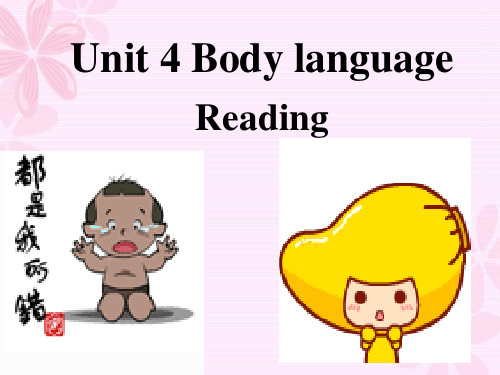
languages are bad. F
5.All members of a culture behave in the
same way.
F
TASK 3:Answer the following questions
1. Is the author of this passage male or female? How do you know ? 2.What were the two mistakes that the author noticed? 3.How can we understand “These actions are not good or bad”?
Fill in the blanks
Body language is used by people for sending messages to one another. In many countries in
the world, men k_is_s__ each other when they meet. In Britain, people usually s_h_a_k_e_ hands
think deeply
stomachache go this way
【课堂互动探究】
Look at the pictures. What are the following ways of communicating?
gesture
posture
facial expression eye contact
Para.1
ParSt.u2mmaDriizfefetrheentmsatuindeidnetas haaccvoerddiifnfegrteont (Parat.h2e-3m) eagnreinetginagndcuksetyomweorrsd. s.
2021英语人教版选择性必修第四册习题Unit 4
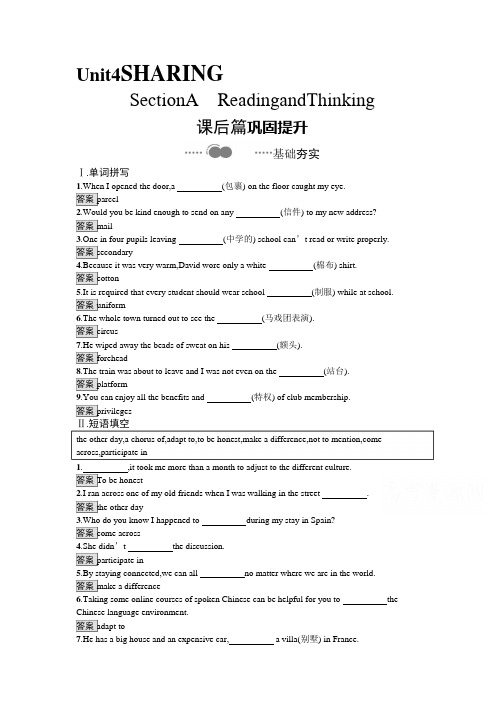
Unit4SHARINGSectionA ReadingandThinking课后篇巩固提升基础夯实Ⅰ.单词拼写1.When I opened the door,a (包裹) on the floor caught my eye.答案 parcel2.Would you be kind enough to send on any (信件) to my new address?答案 mail3.One in four pupils leaving (中学的) school can’t read or write properly. 答案 secondary4.Because it was very warm,David wore only a white (棉布) shirt.答案 cotton5.It is required that every student should wear school (制服) while at school. 答案 uniform6.The whole town turned out to see the (马戏团表演).答案 circus7.He wiped away the beads of sweat on his (额头).答案 forehead8.The train was about to leave and I was not even on the (站台).答案 platform9.You can enjoy all the benefits and (特权) of club membership.答案 privilegesⅡ.短语填空the other day,a chorus of,adapt to,to be honest,make a difference,not to mention,come across,participate in1.,it took me more than a month to adjust to the different culture.答案 To be honest2.I ran across one of my old friends when I was walking in the street .答案 the other day3.Who do you know I happened to during my stay in Spain?答案 come across4.She didn’t the discussion.答案 participate in5.By staying connected,we can all no matter where we are in the world.答案 make a difference6.Taking some online courses of spoken Chinese can be helpful for you to the Chinese language environment.答案 adapt to7.He has a big house and an expensive car, a villa(别墅) in France.答案 not to mention8.To his surprise,his proposal was greeted with laughter.答案 a chorus ofⅢ.完成句子1.他们花了大约三个小时才爬到泰山顶上。
新课标人教版高一英语必修四unit4教案

新课标人教版高一英语必修四 Unit 4 教案教学目标1.了解 Unit 4 主题是“小说和电影”,并学会掌握相关词汇和知识;2.学习阅读文学作品的技巧和方法;3.提高听力和口语能力,能够听懂和表述有关电影和小说的内容;4.培养学生的批判性思维能力。
教学内容本单元的教学内容主要包括以下四部分:1.Introduction & Reading: Introducing Literature and Films2.Listening & Speaking: Films and Novels3.Speaking & Writing: Discussing Favourite Filmsnguage study: Modal Verbs教学过程Introduction & Reading1.学生们在老师的带领下,讨论并了解本单元的主题和学习目标;2.学生们分组阅读一篇有关文学和电影的文章,并在小组内讨论文章的主要观点和结论;3.整个班级讨论文章的内容,并展示各个小组的不同观点。
Listening & Speaking1.给学生播放一段电影片段,并让他们在听完后就内容进行讨论和总结;2.给学生发放一份包括电影和小说内容的练习,并让学生用口语和同桌一起完成练习。
Speaking & Writing:1.学生被分成小组,每组产生一个代表,代表需要先介绍自己喜欢的电影,并谈论电影中的某些特点和值得推荐的原因;2.所有代表回到教室,并通过细节和观点进行辩论;3.接下来,学生们需要写一篇有关一部电影、小说或者文化作品的作文,并将这篇作文与同桌进行分享和讨论。
Language study本单元的语言学习环节将主要集中在Modal Verbs语法和习惯用法上。
学生需要通过阅读和翻译文本,以及完成会话练习和语言表达作业来掌握这一难点。
教学评估1.通过小组讨论和全班讨论来听取学生的观点和意见;2.通过听力和口语练习来检查学生的听力和口语能力;3.通过作文和语法作业来检测学生对知识点的掌握情况。
新人教版高中英语必修四Unit4 Body Language Reading教学反思与心得体会
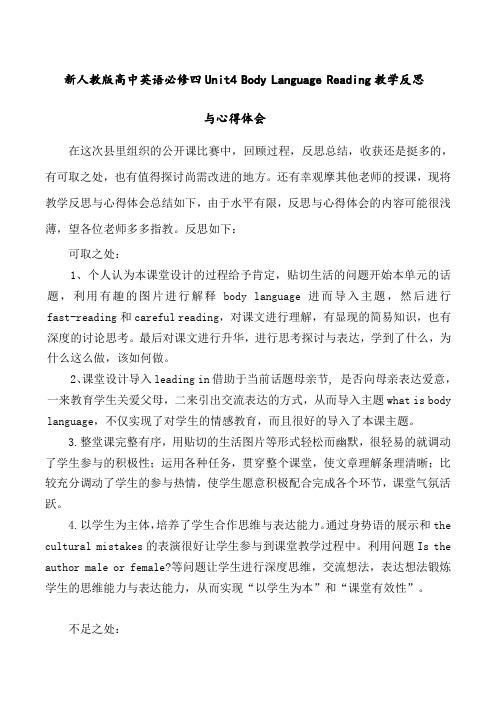
新人教版高中英语必修四Unit4 Body Language Reading教学反思与心得体会在这次县里组织的公开课比赛中,回顾过程,反思总结,收获还是挺多的,有可取之处,也有值得探讨尚需改进的地方。
还有幸观摩其他老师的授课,现将教学反思与心得体会总结如下,由于水平有限,反思与心得体会的内容可能很浅薄,望各位老师多多指教。
反思如下:可取之处:1、个人认为本课堂设计的过程给予肯定,贴切生活的问题开始本单元的话题,利用有趣的图片进行解释body language 进而导入主题,然后进行fast-reading和careful reading,对课文进行理解,有显现的简易知识,也有深度的讨论思考。
最后对课文进行升华,进行思考探讨与表达,学到了什么,为什么这么做,该如何做。
2、课堂设计导入leading in借助于当前话题母亲节, 是否向母亲表达爱意,一来教育学生关爱父母,二来引出交流表达的方式,从而导入主题what is body language,不仅实现了对学生的情感教育,而且很好的导入了本课主题。
3.整堂课完整有序,用贴切的生活图片等形式轻松而幽默,很轻易的就调动了学生参与的积极性;运用各种任务,贯穿整个课堂,使文章理解条理清晰;比较充分调动了学生的参与热情,使学生愿意积极配合完成各个环节,课堂气氛活跃。
4.以学生为主体,培养了学生合作思维与表达能力。
通过身势语的展示和the cultural mistakes的表演很好让学生参与到课堂教学过程中。
利用问题Is the author male or female?等问题让学生进行深度思维,交流想法,表达想法锻炼学生的思维能力与表达能力,从而实现“以学生为本”和“课堂有效性”。
不足之处:1. 学生思考的广度不够,阅读中停留在reading for information较多,而缺少reading for thinking,教学过程中基本上基于信息找寻的问题居多,而进行深入思考的的问题过少而且范围狭窄。
高中英语人教版必修四unit4_Body_language-reading公开课课件ppt课件
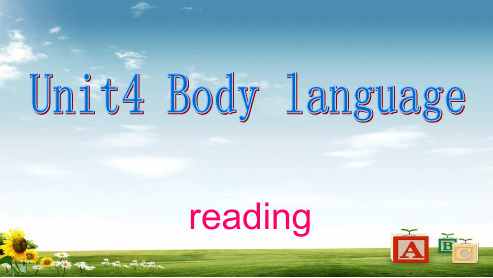
Part 3: (Para 4 )
Part 4: (Para 5)
D) Examples of learned or cultural “body language”.
Matching the people and the different ways of greeting (para2&5)
Tony Garcia (Columbia) Julia Smith (Britain) Akira Nagata (Japan) George Cook (Canada)
Careful reading :
shakes hands and kisses others twice on each cheek Bows
shakes hands approaches others closely and touches their shoulder and kisses them on the cheek does not stand very close to others or touch strangers
Columbia
Britain
Julia Smith
George Cook Akira Nagata
Canada
Japan Jordan
Ahmed Aziz
Darlene Coulon
You
France China
Fast reading:
Which is the main idea of the text?
reading
Come here !
Good ! / Great !
“No,You can not do that"
OK
• She is deaf and dump, so body languagee.
Unit-4-Reading-and-thinking-教案--高中英语人教版选择性必修第四册
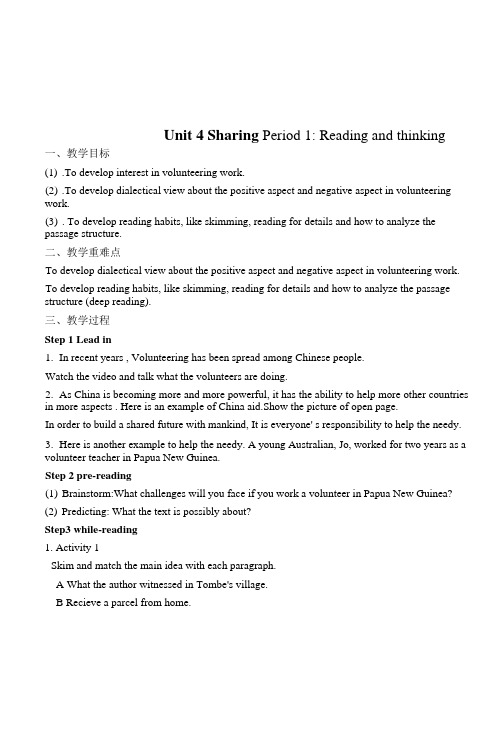
Unit 4 Sharing Period 1: Reading and thinking 一、教学目标(1).To develop interest in volunteering work.(2).To develop dialectical view about the positive aspect and negative aspect in volunteering work.(3). To develop reading habits, like skimming, reading for details and how to analyze the passage structure.二、教学重难点To develop dialectical view about the positive aspect and negative aspect in volunteering work. To develop reading habits, like skimming, reading for details and how to analyze the passage structure (deep reading).三、教学过程Step 1 Lead in1.In recent years , Volunteering has been spread among Chinese people.Watch the video and talk what the volunteers are doing.2.As China is becoming more and more powerful, it has the ability to help more other countries in more aspects . Here is an example of China aid.Show the picture of open page.In order to build a shared future with mankind, It is everyone' s responsibility to help the needy.3.Here is another example to help the needy. A young Australian, Jo, worked for two years as a volunteer teacher in Papua New Guinea.Step 2 pre-reading(1)Brainstorm:What challenges will you face if you work a volunteer in Papua New Guinea?(2)Predicting: What the text is possibly about?Step3 while-reading1. Activity 1Skim and match the main idea with each paragraph.A What the author witnessed in Tombe's village.B Recieve a parcel from home.Would you like to become a volunteer teacher? Why or why not?四、教后反思(不少于100字)。
【公开课课件】Unit4+Reading+for+writing时光机人教版选择性必修第四册

My sister is senior to me by 3 years.
In sci-fi stories, robots often become superior and take over. (P6)
I pushed the starting lever on the main panel forwards an inch then immediately backwards again.
backward adv. 向后;倒着;往回
例:跳水运动员向后翻转跳入水中。
The diver flipped over _b_a_c_k_w__a_r_d_ into the water.
to come see the wonders of the world in the near or distant future. see what the future hold in store for us.
Look know more about the time machine.
the leather seat the starting lever(操纵杆)
My niece came in to fetch something, maybe her handkerchief, apparently without seeing me.
句意:我的侄女进来拿东西,也许是拿她的手帕,但她显然没看见我。
fetch vt.(去)拿来;(去)请来 fetch sb. sth. 替某人去取(拿)……
人教版高中英语必修4 第四单元unit4单词讲解

重点单词.词组讲解1. greet vt. 问候,迎接,招呼(+with)She greeted her guests at the door.She greeted him with a smile. greet sb.with...用……向某人打招呼(欢迎某人) greeting n. 招呼,问候She waved a friendly greeting.【期末测试】Whenever I met her, _________ was fairly often, she greeted me with a sweet smile.A. whoB. whichC. whenD. that【2013新课标2完形】23.A.helps B .chooses C. greets D. sees 【2013广东】The next day Tom appeared as the powerful Superman waving his hand to the people greeting him along the way.2. represent1)vt.象征;表示;The dove represents peace.2) vt.作为...的代表They said that they represented the committee. 他们说他们代表该委员会。
区别:represent,stand forrepresent “表示,代表,说明”多用于实体代表,有被动。
stand for “代表,意味”多用于抽象事物代表。
一般指符号或标志等,无被动。
The dove represents peace.U.N stands for the United Nations.【2015安徽】In many cultures, round foods such as grapes, bread, and moon cakes are eaten at welcome celebrations to represent family unity.3. association1)n.协会,公会,社团[C]Have you joined the teachers' association?2)n.联想,联想物[C][U]He has no association with foreigners. have (no)association with...与…有(没有)联系associate v.联想,把...联想在一起They associate turkey with Thanksgiving. associate...with...把……与……结合起来【2012北京完形】48. A. attention B. association C. attraction D. adaptation 【2014浙江】We associate piggy banks with children4.curious adj. 好奇的,渴望知道的The boy was curious about everything he saw. be curious about 对……感到好奇He’s curious to know what she said. be curious to do sth. 渴望做……curiously adv. 1. 好奇地2. 奇异地,奇怪地;说来古怪He looked curiously at the people.curiosity n. 好奇心She did that just out of curiosity. from/out of curiosity 出于好奇【期末测试】People have always been about exactly how life on earth began.A. curiousB. excitedC. anxiousD. careful【期末测试】Little Johnny felt the bag, curious to know what it ____.A. collectedB. containedC. loadedD. saved【2014新课标1】you can take a photo or write a poem that shows what they are curious about.5. approach vt. vi1) 接近,靠近(可指距离或时间)When I approached, they grew silent.2) 找...商量Did Mary approach you about lending her some money?approach sb. on/about sth.与某人接洽/商量某事名词n.1) 接近,靠近;即将达到[U][(+of)]Snow announced the approach of winter.2) 通道,入口[C][(+to)]All approaches to the village are blocked.3) 方法,方式;态度I like her approach to the problem. approach to 接近;近似;(做某事)的方法(途径) 可以与介词to搭配的名词有:answer/key,entrance,visit(or),way/road,guide,monument等。
最新人教版高中英语必修四Unit4_body_language_reading精品ppt课件

I’m very excited.
Welhe following facial expressions ?
surprised astonished
shy
happy
When people meet each other…
In Russia, France and Arab countries men kiss each other.
姿势;手势
Do you know the meaning of the following gestures ?
Stop!
Come It’s ok. You are very here. good. Bye-bye. / Well done!
Do you know the meaning of the following body movements ?
George Cook (Canada)
a Japanese Julia Smith (Britain)
Mr. Garcia (Columbia)
Listen to the tape and match the main idea of each part with lines. Part 1. Different people have different (Para.1) body language. Part 2. Summary of body language. (Para. 2~3) Part 3. (Para. 4) Meet the visitors at the airport.
Find out the two cultural mistakes in Para2:
The first mistake Tony Garcia (Columbia ) Julia Smith (Britain) George Cook The second mistake (Canada) Akira Nagata (Japanese)
Unit 4 Reading for Writing语言点(课件)高中英语人教版选择性必修第四册

14
5. Today, I want to relay to you that I'm proud of the work my mother has done, and I am now supportive of it.
今天我想告诉你们的是,我为我妈妈所做的工作感到骄傲,我现在也
我母亲还到农村巡 回治疗,帮助残疾人,为当地医生提供咨询和 培训。
n. 咨询;咨询会
consult vt.咨询;请教;查阅;商量 ✓concosunlstualnttsbn.. a顾b问ou;t/高on级s顾th问. 关医于师某,事会请诊教医/师咨;询咨某询人者 ✓ consult with sb about/on sth. 与某人协商某事 ✓ consult the dictionary 查字典 ✓ consult....for... 为······查阅(词典、参考书等)
is wet.
③ ____A__s____it was late, we came back soon. ④ We can't go out______b_e_c_a_u_s_e_____ it is too cold.
单句语法填空 Exercise
1. She__h_a_s_r_e_tu_r_n_e_d__(return) from India lately.
我们都想当然地认为他们已经完成了他们的任务。
3) Human beings __to_o__k_it__fo_r_g_r_a_n_t_e_d__ (以为它理所当然) that their brains held all the solutions, but maybe their hearts can be a better guide.(2019江苏高考)
新课标人教版必修四Book4 Unit4 Reading
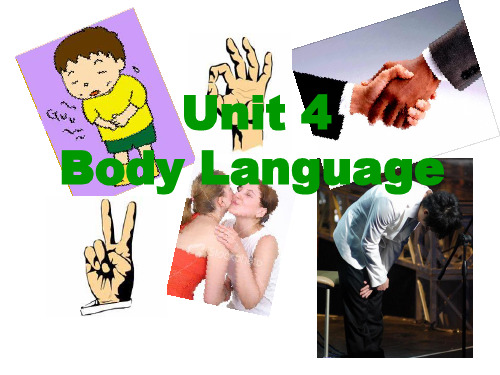
Ways to greet each other Approach others closely and are more likely to touch them. Shake hands, do not stand very close to others or touch strangers when they meet. Bow Shake hands. Shake hands and stand quite close to other men. Nod to women but do not shake hands with them.
我的课堂我做主
Assignment(任务分配)
Group1. → Question (3,4). Group2. → Question (5). Group3. → Question (1). Group4. → Question (2). Group5. → Question (6). Group6. → Question (7).
Japan: bow
Some western countries: hug
Russia, France, Arab: kiss
Reading
Communication:
No problem?
Learning aims
• 1、To learn some new words and phrases. • 2、To know different body languages represent different meanings. • 3、To respect other country’s body languages.
Why do we need to study body language?
人教版选择性必修第四册Unit4 Reading and Thinking
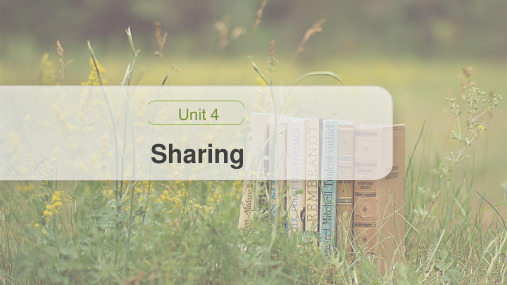
[名师点津] not to mention“更不用说”,相当于一个插入语,但其后所接 的词的形式要求与前面的词平行一致,一般用于否定句之后。表达“更不用 说”的短语还有:①let alone ②not to speak of。
Sometimes I wonder how relevant chemistry is to these students—few
(1)I’ve heard that,in the Sahara,there is no shade during the day,and the stars seem especially brilliant on clear nights. 我听说在撒哈拉,白天没有阴凉之处,在晴朗的夜晚星星看起来格外灿烂。 (2)Water is usually warmer in direct sunlight than in the shade . 水通常是在阳光直射的地方比在阴凉处温度高。 (3)Its long branches and leaves shade them from/against the sun. 它长长的树枝和树叶为他们遮挡了阳光。 (4)I saw that merchant sitting under the shade of a tree,reading a book. 我看见那个商人坐在树荫下读书。
Unit 4
Sharing
内容索引 Period Two Reading and Thinking—Language Points
1. parcel
2. jam 3. mail
4. clay 5. weed
基 础 自 测 自主学习 落实基础知识
n.包裹 vt.裹好;打包 n.果酱;堵塞 n.邮件;信件;邮政 vt.邮寄;发电邮给 n.黏土;陶土 n.杂草;野草 vt.& vi.除杂草
高中英语必修四unit4Reading

Unit 4 Reading Communication: No problem?
Brainstorming
1. What is the purpose of language? The purpose of language is to communicate with other people.
1. Englishmen often stand close to others or touch strangers as soon as they meet. F
2. Most people around the world F now greet each other by kissing.
George Cook (Canada)
Julia Smith (Britain)
Tony Garcia (Columbia)
First-reading
I. While reading, please try to divide the whole passage into several parts and find out the main idea. Part 1. (Para. 1) Meet the visitors at the airport.
Part 4. (Para. 5) Summary of body language.
II. How do different international students behave when they greet people? Complete the chart with information from the passage.
3. There are many different ways to greet someone using words. How many ways can you think of to greet someone if you cannot speak?
高一英语必修四_unit4__reading课件

Unit 4 Body language •What do you think the purpose of language?•How can you communicate with someone if you cannot speak?•How many ways can you think of to greet someone if you cannot speak?Communication: No problem?•Step1. fast reading•1) What is the main idea of the text?2) How many parts can we divide the passageinto?3) What’s the main idea for each part?•1) What is the main idea of the text?–The passage introduces some examples of cultural body language when greetingpeople.•2) How many parts can we divide the •passage into?–Part 1 (para. 1)–Part 2 (para. 2 and 3 )–Part 3 (para. 4 and 5 )3) What’s the main idea for each part?Part 1 (para. 1)We are sent to Capital International Airport to meet some international students.Part 2 (para. 2 and 3)Examples of learned or cultural “bodylanguage”.Part 3 (para. 4 and 5)Different people have different physical ways to greet others. Learning about their customs can help avoid difficulties in communication.Step 2. Scan the text and find outCountry / Area Ways to greet each otherBritain Shake hands. Do not stand very close to others or touchstrangers when they meet.Canada Shake hands.Japan Bow.Spain, Italy, SouthAmerican countriesApproach others closely and are more likely to touch them. France Shake hands and kiss each other twice on each cheek.Middle East, some Muslim countries Shake hands and stand quite close to other men. Nod to women but do not shake hands with them.Name Description Body language To whom Tony Garcia man from Colombia Kiss on the cheek everyoneJulia Smith woman from Britain no touching everyoneAkira Nagata man from Japan bowing everyone George Cook man from Canada shaking hands everyoneAhmed Aziz man from Jordan shaking handsnodding to manto womanDarlene Coulon woman from France shake hands and kisstwice on each cheekpeople she knowsStep 3. use the passage to help you answer the following questions1) Is the author of this passage male or female? How doyou know?The author is male. Ahmed Aziz will not shake hands with women, but he shakes hands with the author.2) What were the two mistakes that the author noticed?He noticed that the Colombian man kissed theBritish woman, but in her culture, a kiss from astranger is not expected. He also noticed that theJapanese man bowed just as the Canadian manstarted to shake hands, so one man’s nosetouched the other man’s hand.•3)Who seemed to prefer to keep more physical diastance from others? Who seemed to prefer closer physical distance ?•The British woman, Julia and probably the Canadian man, George, seemed to prefer to keep more physicaldistance from others. The Colombian man, Tony, and the Jordanian man Ahmed, seemed to prefer closer physical distance.•4) Did any students have similar greeting customs? If so, which one?•Yes. Tony from Colombia and Darlene from France had a similar greeting custom —a kiss. George from Canada and Ahmed from Jordan also had a similar greeting custom —a handshake, but Ahmed shakes hands only with men.•5) “When in Rome, do as the Romans do.”What do you think this famous saying means?•This saying means that when we are in a certain place, we should follow the customs of the people who live in that place, not our own customs.•6) Do you agree with the author’s statement that body language is not good or bad? Why or why not?Step 4. summaryStep 5. translation1.The first person to arrive was TonyGarcia, closely followed by Julia Smith from Britain.2. Not all cultures greet each other thesame way, nor are they comfortable in the same way with touching or distance between people.3. However, people from places like Spain,Italy or South American countriesapproach others closely and are morelikely to touch them.Step 5. homework •Complete p.27 Exercise 3。
英语精品 新教材选择性必修四UNIT 4 Reading and Thinking

UNIT 4SHARING主题语境——人与社会之社会服务与人际沟通——人际关系【语境概说】本单元的主题语境为人与社会之社会服务与人际沟通——人际关系,该主题语境主要为良好的人际关系与社会交往;社会公益事业与志愿服务;跨文化沟通、包容与合作等。
该主题与学生学习和生活密切相关,这有助于培养学生良好的人际关系,增强社会公德意识,促进学生的沟通能力、包容与合作优良品质,使之成为对社会有益的全面发展的人才。
Section ⅠReading and Thinking(1)1.Discussing—Look at the following pictures and answer the questions.What events are these pictures related to?The__answer__is__open.2.Predicting—Look at the pictures and the title on Page 38 and predict what the text is probably about.The__text__is__probably__about__volunteering__in__the__Bush.1.First reading—Read the passage carefully and do the following exercises.(1)Match the main idea with each paragraph.Para.1 A.What the author witnessed in Tombe’s villageParas.2~3 B.Receive a parcel from homeParas.4~7 C.The author’s feeling after visiting the villagePara.8 D.The conditions about the bush school and the students答案Para.1 B Paras.2~3 D Paras.4~7 A Para.8 C(2)Read for details.①What has been Jo’s most challenging subject to teach? Why?Science__is__Jo’s__most__challenging__subject.Because__the__students__have_no __concept__of__doing__experiments.②What did Jo notice after the meal?He__noticed__a__can__standing__upside__down__on__the__grill__over__the__fire .After__a__while,Tombe__threw__it__out__of__the__doorway.2.Second reading—Fill in the blanks according to the passage.3.Third readingSummarizing:Read the text again and try to summarize the main idea in one sentence. The__author__told__us__about__his__experience__when__he__worked__as__a__v olunteer__in__a__remote__place.1.Group work:If you are a journalist of your school English newspaper,please make an interview with some students about voluntary work according to the text.You may start like this.A:Hello,I’m a journalist of our school English newspaper.What do you think of acting as a volunteer in a poor and remote area?B:...2.Would you like to become a volunteer teacher? Why or why not?The__answer__is__open.阅读技巧点拨如何阅读课文内容?1.Adjust the speed of reading to have a good understanding of the text.2.If the material is easy to understand,one should read it quickly.3.If the material is difficult,one can read it slowly and carefully.4.Refer to the dictionary if necessary.语言现象感知Ⅰ.单词理解体会句中加黑单词的词性和含义1.The parcel came in this morning’s post.n.包裹2.Please come for your mail whenever it’s convenient.n.邮件3.The water in the pan was beginning to bubble.v i.沸腾4.A cloud of dust rose as the truck drove off.n.灰尘5.I find it really hard to drag myself out and exercise regularly.v t.强迫Ⅱ.词块积累写出下列词块的含义1.a bit damaged有点儿损坏2.be dying to do sth渴望做某事3.a dusty track一条尘土飞扬的小道4.be greeted by被……迎接;受……欢迎5.not to mention更不用说6.adapt to these conditions适应这些条件7.have no concept of没有……概念8.the other day不久前某一天9.to be honest说实话10.stick out of the roof露出屋顶11.throw out of抛出12.participate in their conversation参与他们的谈话Ⅲ.句式欣赏1.It takes/took sb some time to do sth花费某人时间做某事It takes me only a few minutes to walk to school down a dusty track covered in weeds.2.see+宾语+动词-ing形式(作宾补)When we arrived at the village,Tombe’s mother,Kiak,saw us coming and started crying “ieee ieee”.3.even though虽然;即使I loved listening to the family talking softly to each other in their language,even though I could not participate much in the conversation.Ⅰ.阅读理解ABig Brothers Big Sisters is based on the simplicity and power of friendship.It is a program which provides friendship and fun by matching vulnerable__young__people (ages 7-17) with a volunteer adult who can be both a role model and a supportive friend.V olunteer tutors come from all walks of life—married,single,with or without children.Big Brothers and Big Sisters are not replacement parents or social workers.They are tutors:someone to trust,to have fun with,to talk and go to when needed.A Big Sister and Little Sister will generally spend between one and four hours together three or four times each month for at least twelve months.They enjoy simple activities such as a picnic at a park,cooking,playing sport or going to a football match.These activities improve the friendship and help the young person develop positive self-respect,confidence and life direction.Big Brothers Big Sisters organizations exist throughout the world.It is the largest and most well-known provider of tutor services internationally and has been operating for 25 years.Emily and Sarah have been matched since March 2008.Emily is a 10-year-old girl who has experienced some difficulties being accepted by her schoolmates at school.“I was pretty sure there was something wrong with me.”Emily’s mum came across Big Brothers Big Sisters and thought it would be of benefit to Emily by “providing different feedback(反馈) about herself other than just relyingon schoolmates to measure her self-worth.”Sarah wanted to get involved in a volunteer program.“I goggled it and found out how to be a part of it.I thought it would be fun for me to get involved in making time to do something because sometimes it’s all work and no play.”Big Brothers Big Sisters has been of great benefit and enjoyment to both Emily and Sarah.They love and look forward to their time together and the partnership has certainly helped Emily be more comfortable in being the wonderful,happy and unique girl she is!【语篇解读】大哥哥大姐姐是一个通过招募志愿者为脆弱的青少年提供指导和友情的活动。
- 1、下载文档前请自行甄别文档内容的完整性,平台不提供额外的编辑、内容补充、找答案等附加服务。
- 2、"仅部分预览"的文档,不可在线预览部分如存在完整性等问题,可反馈申请退款(可完整预览的文档不适用该条件!)。
- 3、如文档侵犯您的权益,请联系客服反馈,我们会尽快为您处理(人工客服工作时间:9:00-18:30)。
n. 方法;步骤;通路;通道 C an ~ to sth. an ~ to doing sth.
做……的方法/途径 见P53
v. 走近;靠近;接近
The summer is approaching.
夏季即将来临。
相关短语: keep in touch with sb 与某人保持联系 lose touch with sb be out of touch with sb 与某人失去联系 get in touch with sb 与某人取得联系
~ation n.
例句见P52
curious adj. curiosity n. be curious about sth. 对……好奇
be curious to do sth. 急于……
out of curiosity 出于好奇
introduce vt.介绍,引进,传入 名词: introduction. make a self-introduction 作自我介绍
Germany
Japan
Gestures Shaking one’s head
countries Bulgaria, parts of Greece, Iran
Meaning
Yes
Other countries
No
Can you guess what the following gesture from Japan means ?
Not all cultures greet each other the
same way, nor are they comfortable
in the same way with touching or
相关短语: introduce...to...把......介绍给...... (to 后接人或物); introduce ... into ...把......传入,引入...... (into 后接表示地方的词) Please allow me to introduce Mr Smith. Potatoes were first introduced into Europe from South America.
Expressions preview
defend against 保卫…以免受
Reading
COMMUNICATION:
NO PROBLEM?
JapaneseAkira Nagata
George Cook (Canada)
Julia Smith (Britain)
Tony Garcia (Columbia)
Airport to meet this year’s international
students.
Part 2 (para. 2 and 3 ) Examples of learned or cultural “body
language”. Part 3. (para. 4 ) Different peoples have different body languages. Part 4. (para. 5) Summary of body language.
defence n. [U] in ~ of 为了保卫… defend vt. 保护;保卫 见P53
defend against 保卫…以免受…
apologize v. apology n. apologize to sb. (for sth. / doing sth.) make an apology to sb. for (doing) sth. accept / refuse an apology
She stepped back appearing surprised and put up her hands , as if in defence . 他吃惊的往后退,举起双手好象在防卫。
appear 意为"显得,好象". It appears that .. 意为"看起来....".例如: It appears that the plane is very small when it flies in the high sky . 飞机在高空飞行显得非常小.
As they were introduced , George reached his hand out to the Japanese student. 当他们被介绍对方时,乔治把手伸向了那个日本学 生。 reach vt. & vi.到达,伸向,延伸,通向。 He reached London last week . 他上周到达了伦敦。 他伸出手去拿枪。 He reached for the gun. 去年夏天这片森林一直延伸到河边。 The woods reached as far as the river last summer .
Read the text carefully, then decide whether the following statements are true (T) or false (F).
• Englishmen often stand close to others or touch strangers as soon as they meet. F
Tony approached Julia, touched her shoulder and kissed her on the cheek.
动词 + sb. + 介词(in/ on/ by等)+the +
身体部位 见P54
approach
n. 靠近;临近;接近
We heard the approach of the train.
T • French people behave warmly to the people that they know. T
statement state vt.
n.[C] 陈述,说明,声明
greet vi. vt. 问候,迎接,致敬 P52 ~ (to)sb. with sth. 以…向某人问候 ~ing represent --- vt. 表现;代表;象征
Name
Description Body To Language Whom Tony man from kiss on the everyone Garcia Colombia cheek woman from Julia no touching everyone Britain Smith Akira Nagata man from Japan bowing everyone
Words preview
curiously adj. 好奇地
Colombia n. 哥伦比亚 approach vi. & vt. 接近;靠近;走进
n. 接近;方法;途径 cheek defend defence n. 面颊 vt. 保护;保卫 n. 防御;保卫
Words preview
major misunderstand misunderstanding Jordan dash adult adj. 主要的 vt. 误解;误会 n. 误解;误会 n. 约旦 vi. 猛冲;突进 n. 成人;成年人 adj. 成人的;成熟的
While reading, please try to divide the
whole passage into several parts and find
out the main idea. Part 1. (para. 1)
You are sent to Capital International
• Visitors greet each other differently when they meet for the first time. T
• Japanese will bow to others as greeting. T
• People from Jordan will move very close to you as you introduce yourself to them.
辨析: appear , seem , look 的用法区别 都可以做系动词,并且都可表示为"似乎; 好象;看上去" 从词义上看,appear表示从外表或表面看 上去"好象;似乎",因此有时暗含着事实上 并非如此的意思; look 强调从视觉上得出的印象; seem 则表示有某种根据的判断,这种判 断往往接近或符合事实的。
Which is the main idea of the text? A. There are different customs in different countries. B. Foreigners should follow the customs of the country where they are visiting. C. People use body languages to send messages and different body languages have different meanings. D. The importance of knowing customs.
Gesture
a circle with one’s thumb and index finger
Country most countries Japan France Germany Brazil
Meaning
OK
money zero rude
thumbs up
the US Niger
Description Body To Whom Language George man from shaking everyone Canada hands Cook shaking to men Ahmed man from hands to women Aziz Jordan nodding shake Darlene woman hands and people she knows Coulon from France kiss twice on each cheek
